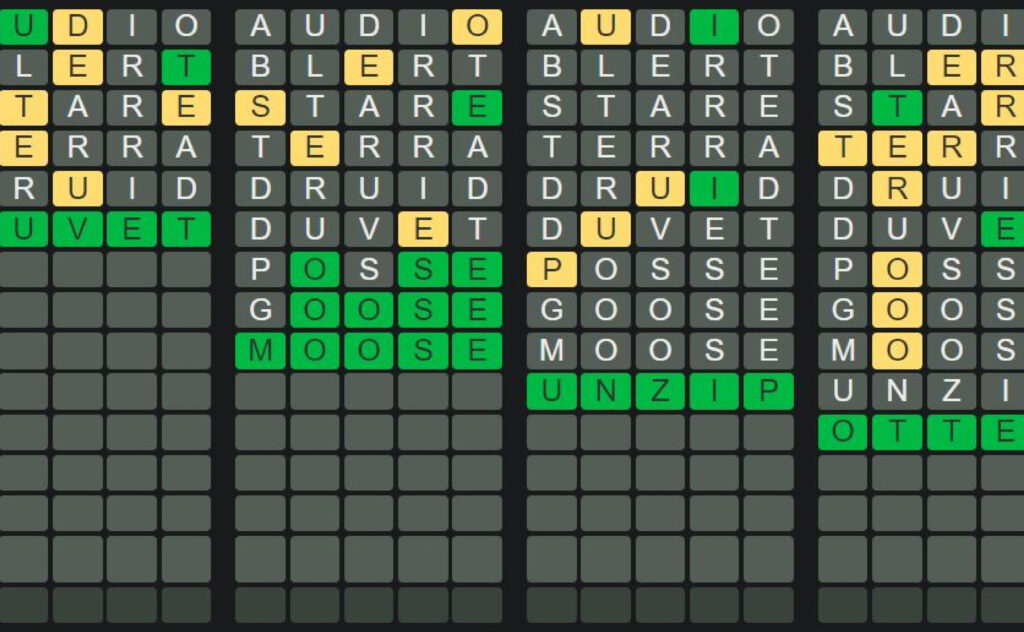An Octordle Sequence is a complex arrangement where each element follows a specific, ordered pattern. This sequence is used in advanced mathematical problems and algorithms to model and solve intricate problems. Its unique structure makes it valuable for understanding complex systems and optimizing data processes.
Table of Contents
The Basics of Octordle Sequence
An Octordle Sequence is built on specific rules that dictate the arrangement and relationship between its elements. Essentially, it follows a set pattern where each term in the sequence is determined by the previous ones, but with more complexity compared to simpler sequences like the Fibonacci series.
How Octordle Sequences Work
At its core, an Octordle Sequence involves a formula or rule that generates each term based on the preceding terms. This could involve mathematical operations, such as addition or multiplication, applied in a particular way. For example, while a basic sequence might just add a constant number to each term, an Octordle Sequence might use a more intricate formula that combines multiple operations.
Examples of Octordle Sequences
Here’s a simple example to illustrate:
- Example Sequence: 2, 6, 18, 54, 162
In this sequence, each number is multiplied by 3 to get the next number. While this is a straightforward example, real Octordle Sequences can involve more complex rules.
Visual aids like diagrams or tables can be helpful in understanding these sequences. For instance, a table showing the relationship between terms can make it easier to see how the sequence progresses.
Applications of Octordle Sequences
Octordle Sequences find their applications in various fields, making them quite versatile. They are not just theoretical concepts but have practical uses in areas like mathematics and computing.
In Mathematics and Algorithms
In mathematics, Octordle Sequences help solve problems that require a detailed understanding of patterns and relationships. They are used in advanced algorithms to improve problem-solving efficiency and are often applied in areas like cryptography and computational mathematics.
In Data Analysis and Computing
In data analysis, Octordle Sequences are valuable for modeling complex datasets and processes. They can optimize algorithms used in machine learning and data mining, enhancing the ability to analyze large volumes of data quickly and accurately. For example, they might be used in algorithms that predict trends based on past data.

How to Generate Octordle Sequences
Generating an Octordle Sequence involves following a specific rule or formula to produce each term in the sequence. Here’s a basic guide:
Step-by-Step Guide
- Identify the Rule: Determine the formula or rule that defines the sequence. This might involve mathematical operations or functions applied to previous terms.
- Apply the Rule: Use the rule to calculate each term based on the preceding ones. This process can be automated using software tools or done manually for smaller sequences.
- Check the Sequence: Verify that the generated sequence follows the expected pattern and make adjustments if necessary.
Common Challenges and Solutions
One challenge might be ensuring that the generated sequence adheres to the defined rule without errors. Using software tools can help automate the process and reduce mistakes. If the sequence isn’t behaving as expected, double-check the formula and calculations to identify any discrepancies.
Advanced Topics in Octordle Sequences
For those delving deeper into Octordle Sequences, there are more advanced aspects to explore:
Complex Variations and Extensions
Beyond basic sequences, there are complex variations that introduce additional rules or conditions. These variations can model more intricate systems and processes, offering a richer understanding of the underlying patterns.
Research and Developments
Recent research in this area explores new applications and theoretical advancements. For example, researchers might investigate how Octordle Sequences can be applied to new types of data or improved algorithms, pushing the boundaries of their practical use.
Frequently Asked Questions (FAQs) About Octordle Sequences
Common Queries
- What makes Octordle Sequences different from other sequences? They are defined by more complex rules and have specific applications in advanced fields.
- Can I use Octordle Sequences in everyday problems? While they are primarily used in specialized fields, understanding them can offer insights into complex patterns and systems.
Expert Tips and Advice
- Start Simple: Begin with basic examples to grasp the fundamental concepts before moving on to more complex sequences.
- Use Tools: Leverage software tools for generating and analyzing sequences to simplify the process.
Conclusion: Mastering Octordle Sequences
To master Octordle Sequences, it’s crucial to understand their foundational rules and applications. They offer valuable insights into complex systems and processes, enhancing problem-solving and data analysis. For further learning, exploring detailed resources and staying updated with recent research can provide deeper knowledge and practical skills.
